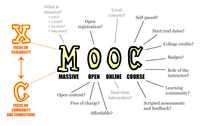
Photo from wikipedia
Recent years have seen a rapid development in the integration of information technology into China's higher education provision. Massive open online courses (MOOCs) have played a vital role in spreading… Click to show full abstract
Recent years have seen a rapid development in the integration of information technology into China's higher education provision. Massive open online courses (MOOCs) have played a vital role in spreading and sharing educational content in China, but problems have been identified with sustaining the learning process, leading to low completion rates. This study integrates the technology acceptance model and the theory of planned behavior to build a theoretical model of the mechanism behind MOOC learning performance. Data were collected from an online questionnaire (N = 638) completed by participants in MOOCs offered by Anhui Agricultural University. Structural equation modeling was then used to analyze the participants' self‐reported MOOC learning experience and outcomes and verify the hypothesized path to improving MOOC learning performance. The results indicate that perceived usefulness, learning attitudes, subjective norms, perceived behavioral control, and learning behavior had significant effects on learning performance, while perceived ease of use was not a significant factor.
Journal Title: Computer Applications in Engineering Education
Year Published: 2020
Link to full text (if available)
Share on Social Media: Sign Up to like & get
recommendations!